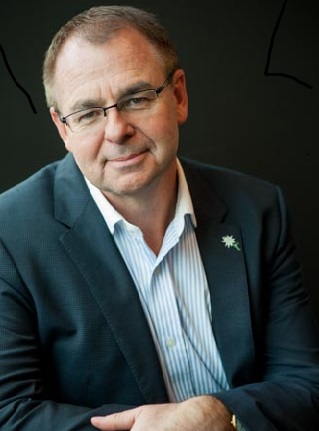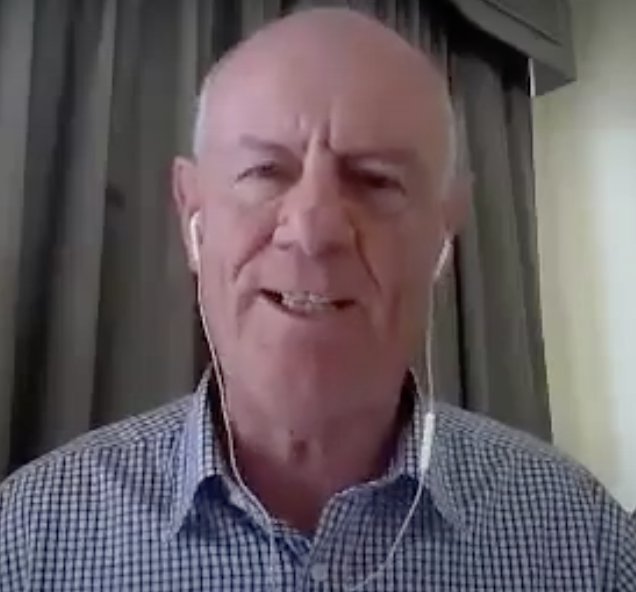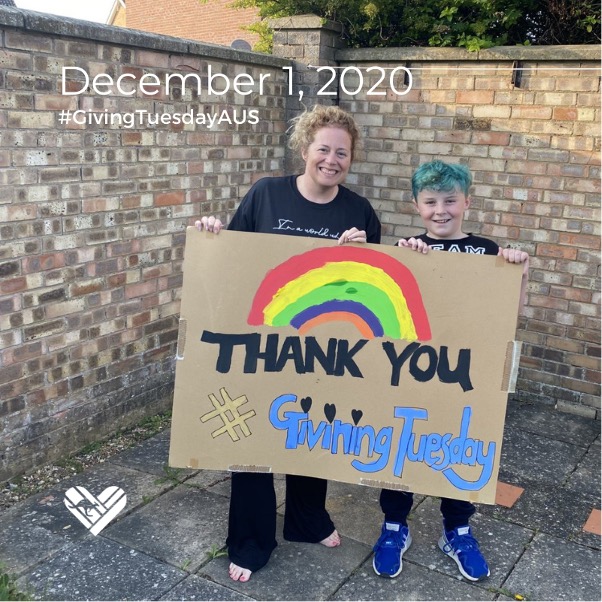CCA Annual Report 2020
Chair Report

I last presented a CCA Chair’s report as we entered the COVID-19 pandemic in Australia. Little did we know how 2020 would play out for so many people and organisations – including CCA. I must say now, on reflection, that I am proud of the way CCA has responded and how the charities sector has pulled together to help us all cope with the challenges of this pandemic.
If I had to list one critical decision that informed our capacity to respond in 2020, it would be the establishment of the Charities Crisis Cabinet.
My co-chair of the Charities Crisis Cabinet, Susan Pascoe, had agreed to work with me and CCA throughout 2020 as we advanced the development of a charities blueprint, a long overdue industry plan for the charities sector. When faced with COVID-19, we chose to put aside the blueprint work, and bring together a cross section of charities sector leaders in what we called the Charities Crisis Cabinet. We felt we needed a group of sector leaders working together so we could respond more immediately to the emerging issues of a global pandemic.
With David Crosbie as the Charities Crisis Cabinet Secretary, Deborah Smith doing so much of the work behind the scenes, and a diverse group of outstanding sector leaders, we were able to advance the need for charities to be factored into a broad range of COVID-19 policy responses.
We were initially quite effective at getting our issues on the national agenda. Perhaps our most important achievement was obtaining concessional access to the national JobKeeper program enabling over 50% of charities that employ staff to gain government support in keeping their staff on the payroll. Other significant gains included supporting concessional taxation arrangements encouraging charitable foundations to give above their required disbursements during the pandemic.
It is sobering to think about where charities might have been if we were not able to advocate so effectively over the last 12 months and were excluded from these critical support programs.
While CCA and the Charities Crisis Cabinet played critical advocacy and catalysing roles, the response of the charities sector to the pandemic also provides testimony to the strength of leadership in many Australian charities.
The CCA annual report this year includes acknowledgement of all the people involved in the Charities Crisis Cabinet and the CCA Board. I would like to emphasise the fundamental importance of the invaluable contributions made by these leaders during 2020. These are heavily committed people, often with huge responsibilities seeking to service communities in real need. The pressures on every charity leader in 2020 increased significantly from the catastrophic bushfires to ever evolving pandemic risks. Business as usual was not an option for most charities. Every charity leader had to work longer, take bigger risks, bring more people with them as they tried to find a positive way through a myriad of new challenges. This kind of work takes its toll. And yet, almost every fortnight throughout most of 2020, most of the Charities Crisis Cabinet members would put aside their immediate organisational needs and come together to share information, develop strategies, actively advocate and work collaboratively to advance changes needed for the charities sector and the many communities they serve.
If we see the best of some people when they are under pressure, I think we saw the best of our sector during 2020. I believe the charities sector should be very proud of what was achieved through so many of us working with each other in 2020.
As chair of CCA and Co-Chair of the Charities Crisis Cabinet, I had the opportunity to work with many outstanding leaders all sharing a commitment beyond self-interest, seeking to enhance the work of charities so we could respond to bushfires and COVID-19, and help build flourishing communities.
I want to again acknowledge my fellow Board Directors all bringing a wealth of experience and knowledge to the Board discussions at CCA. I genuinely enjoy CCA Board meetings. The discussions are interesting and informative, and although there are often a range of views expressed, the focus on collectively working towards a shared goal means we are able to relatively easily develop positive policies and ways forward.
I would like to especially acknowledge three CCA supporters and former Board Directors. Stephen Judd stepped down as head of Hammond Care in 2020 after a remarkable career of achievement. Stephen was one of the founding Directors of CCA and a highly respected supporter.
Lisa O’Brien and Rev Keith Garner were also foundation CCA Board Directors and both stepped down this year. Their wealth of experience and knowledge has been invaluable to CCA over many years and we appreciate their long term contributions to CCA and the sector.
As I have said before, our staff are our primary resource and they are exceptional. David Crosbie and Deborah Smith not only do outstanding work, but they are also clearly driven by the purpose of CCA and the goals we share. For most of 2020 they were joined by Sarah Gavel who first worked at CCA ten years ago. Sarah’s contribution in leveraging the donation dollar campaign and setting the groundwork for a new national campaign supporting charities has been invaluable for CCA.
We were also fortunate to again have some important supporters in 2020. Karen Mahlab and the Pro Bono Australia team continued to amplify our work, Cat Fay and the team at Perpetual provided critical funding support as did Claire Robbs and Life Without Barriers. CCA would be greatly diminished without the generous support of these and other partners who helped us along the way.
At CCA we know our real strength is our members. Without members and their financial contributions, we would not exist. Without members, our policy and advocacy would be not much more than opinion. On behalf of the staff and the Board, I want to thank every CCA member for helping us make a difference.
We are now trying to build back better, and times will not get any easier for charities. As we enter what could well be an election year, CCA will be again relying on your support throughout 2021.
Finally, I want to thank you all for your support of CCA during these trying times, and I look forward to working with you in 2021 as we strive to better serve our communities and build back the kind of Australia we want to live in.
Rev Tim Costello AO
Chair, Community Council for Australia
CEO Report

2020 was in many ways a defining year for peak bodies, including those of us in the charities sector. CCA was needed, our role became critical to many charities, and I am pleased to say that generally we were able to step up to the challenges and ensure the charities sector was able to survive as well as it could given all the difficulties of a global pandemic.
In 2020, CCA membership increased, despite the income levels of many charities either decreasing or not increasing in the way most had anticipated.
The level of engagement with government and key Departments like the Treasury and the ATO increased significantly as we battled to lock in support packages for the sector including the charities JobKeeper packages.
Engagement with philanthropy and broader cross sector collaborations increased.
CCA was busier than ever before, often required to not only pursue our policy reform agenda but also follow up from the latest Charities Crisis Cabinet meeting, preparing letters to Ministers, Prime Ministers, National Cabinet, and others.
The take up and readership of information services like our Daily Diary increased, as did our reach on social media, and the number of different articles and stories CCA was involved in.
What made all this additional work doable was not an increase in resources, although CCA finances improved in 2020 with a stronger membership base and new support from Perpetual, but the energy and support of so many of CCA’s members and key leaders from the charities sector.
I spent more time than ever before talking to sector leaders and supporters in 2020 learning about what was needed and how it might be achieved.
The charities sector is incredibly diverse. Sometimes this diversity is presented as a barrier to collective action, but the work of CCA and the Charities Crisis Cabinet in 2020 showed that diversity can be strength when we collectively and collaboratively work towards shared goals.
We did not get everything we hoped to achieve in 2020, but by most international comparisons, the charities sector in Australia was better supported by governments and philanthropy than most other charities sector around the world.
We still have a lot more work to do.
The many issues of dealing with a global pandemic will be with us for some time.
The impact of high levels of government debt will eventually wash over charities.
While many in the charities sector have been through difficult times recently, there are still many major issues we will need to work together on. We will need your support if CCA is to remain an effective advocate for our sector.
I feel privileged to work at CCA. I am surrounded by amazing leaders: Tim Costello seems to be even more energetic in his advocacy as he gets older, Susan Pascoe continues to offer great insight and leadership, the CCA Board represents some of the best strategic thinkers in our sector and the regular meetings of the Charities Crisis Cabinet were both productive and enjoyable with a real sense of colleagues sharing challenges and working together to achieve what we could in difficult circumstances.
I am also very fortunate to have the wonderful Deborah Smith running CCA behind the scenes and this year we were able to draw on the experience of Sarah Gavel who first worked at CCA ten years ago. 2020 has been a remarkable year. 2021 is also going to be very interesting.
I want to conclude by thanking some the remarkable people who make CCA possible, the CCA members and supporters. Thank you all for standing strong with us in 2020.
I look forward to again standing along side you all as we seek to make Australia a better place in 2021 and beyond.
David Crosbie
CEO, Community Council for Australia
Policy and Advocacy
CCA was founded by leaders in our sector to build flourishing communities by enhancing the extraordinary work of Australia’s charities and not for profit sector. Together, we seek a policy and regulatory environment that works for community organisations - not against them.
Thank you to our members and our partners for your involvement, contributions and support throughout 2020 – and in the decade since CCA’s foundation. The support charities secured in the last year would not have happened without you.
Out of the fires
|
The cheapest form of charity is just handing the money out, and that’s how the quick and greedy get more than the needy. The idea is to use the charity money carefully, mindful of the long-term impact. Governments turn to charities in these crises because they know they haven’t got the systems in place themselves to do what the charities know how to do. CEO David Crosbie, 7 News
|
Charities stepped up to support communities through the Black Summer bushfires. We saw an outpouring of Australian generosity - and some ill-informed and at times opportunistic criticism levelled at charities. CCA responded to direct attacks on charities that threatened public trust in the sector, highlighting the complexity of recovery efforts and the contribution of charities.
We engaged with Government, parliamentarians, the public, the National Bushfire Recovery Agency and the Royal Commission into National Disaster Arrangements on the role and critical value of charities in crisis, recovery and in building resilience. The importance of social connection – the social infrastructure that is at the heart of our communities and the work of our charities – was acknowledged by leadership within the NBRA and by the Royal Commission.
Charities must be central to Australia's resilience building and disaster preparedness, response and recovery agenda. CCA continues this advocacy.
Beyond the Money – the real value of charities in a crisis, 13 November, The Advocate. (Cover story) For anyone concerned about preparedness, about resilience, about communities and crisis, one of the best things we can all do is in some way connect with others.
Into pandemic
|
‘Our work together over the past decade has built credibility and capacity, both of which have proved crucial over the past months.’
|
One of CCA’s first responses as charities faced the unfolding Covid-19 crisis was to form and support the work of the Charities Crisis Cabinet. We brought together leadership, experience and knowledge from across the diversity of the charities sector to highlight issues and consider responses to support as many charities as possible to survive the crisis and be there to support their communities into recovery.
CCA also continued to engage directly with government, our political leaders and the media. We collaborated with partners across our sector to highlight issues and contributed to the collective leadership that was critical in securing the support the sector needed. Together, we took charities from being omitted from government pandemic programs to sustain business during the crisis, to securing key concessions that ensured many charities could not only participate in government support programs but gain significant concessions tailored to better meet their needs.
As Tim noted when speaking with CCA members in June, there is little doubt that our achievements in 2020 would not have been possible without the credibility and capacity built by the foresight and investment of our members in forming CCA over ten years ago.



































